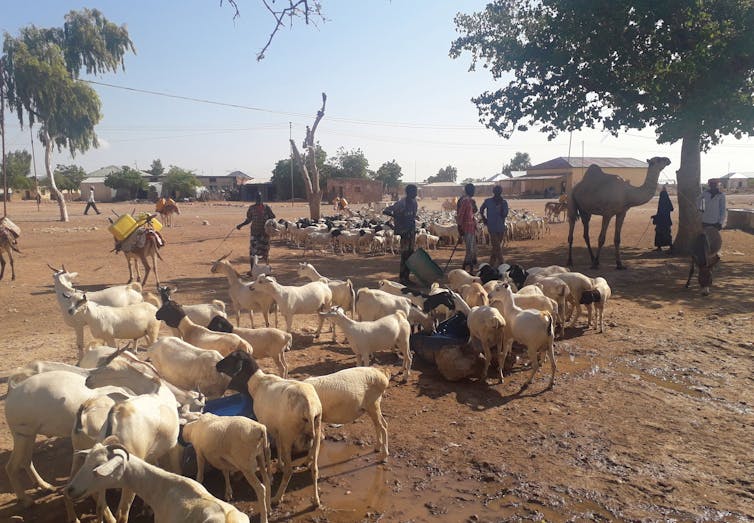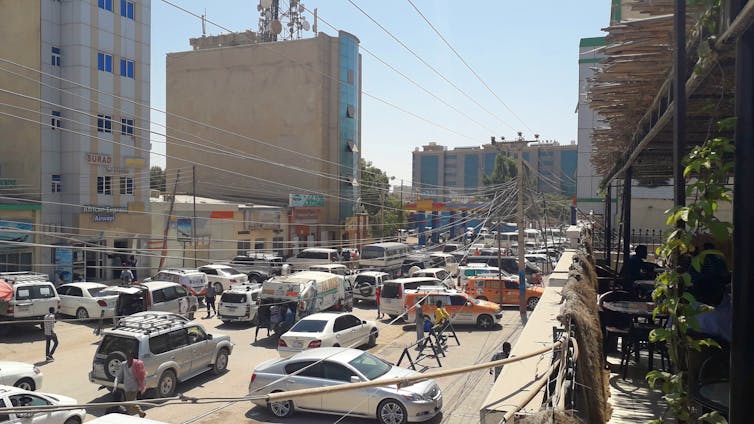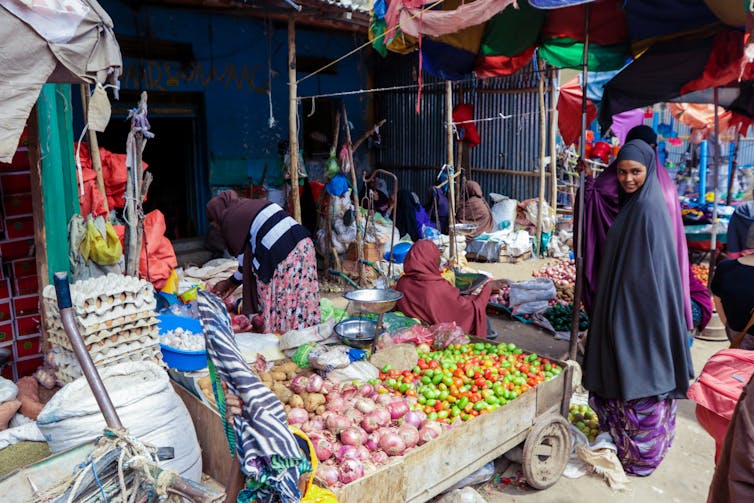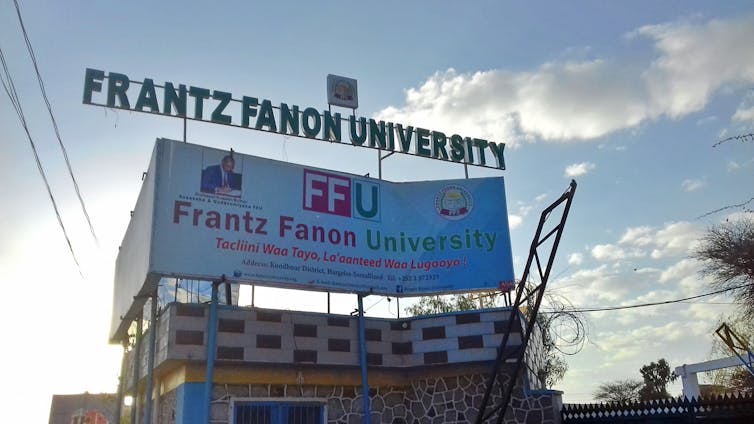Hargeisa, the capital of Somaliland, september 16, 2021. Eduardo Soteras/AFP
Robert Kluijver
Thirty years ago, as Somalia sank into civil war, the northwestern part of the country seceded. It declared itself independent under the name of Somaliland. Since then, this country has built a state, a democratic order, its own currency and an economy. It has mostly experienced peace,unlike neighboring Somalia.
Somaliland, as large as half of France, is populated by three to four million people. It commands a strategic position on the southern shores of the Gulf of Aden, one of the major areas of global maritime transit.
For thirty years, this country has sought diplomatic recognition, as a good neighbour and respecting international rules. Yet it is not recognized. What for?
Context
Somaliland was first, since 1887, a British protectorate. In 1960 it was seamlessly integrated into independent Somalia, which was formed after Italian colonization and tutelage. For two decades, everything went well, even though the country, with the exception of the capital Mogadishu, stagnated and suffered from a lack of development.
But in the 1980s, Siad Barre’s military regime began to purge itself of clans that the dictator no longer trusted, including the Isaaqclan family, the majority in Somaliland, going so far as to bomb the regional capital, Hargeisa, as well as Somaliland’s second city, Bur’o, and fill mass graves with thousands of civilians purged in genocidal campaigns. . That is why, as early as 1991, the Isaaq clan leaders seized the opportunity of the civil war that inflamed Somalia and proclaimed the independence of Somaliland.
They forged ties with the other Somali clans inhabiting the territory – belonging to the Dir and Darood clan families – to extinguish local conflicts. Long talks between the inhabitants, financed by the diaspora, traders and the population, forged a state, which in the late 1990s acquired a constitutional democratic electoral system. In the meantime, the economy has rebuilt itself on a new basis.
A growing economy
Somaliland is not endowed with mineral wealth, and it barely rains there, which severely limits agriculture. The country mainly exports goats, sheep, camels (raised by nomads and destined for slaughterhouses in the Gulf) and some aromatic gums (myrrh and incense). But its economy is mainly based on business,thanks to the good connections of the Somali diaspora in the Gulf countries, in the West and elsewhere. The country also aims to ensure a greater share of commercial transit to Ethiopia, which would like to reduce its dependence on the port of Djibouti.

A visit to Hargeisa (which is easily organized,I encourage you) shows a city seized by real estate fever, financed by telecom companies, money transfer companies, and commerce.

The cafes are open until the wee hours; it is one of the safest capitals in Africa. There are art centers, luxury boutiques, designers and plenty of beauty salons as well as an abundant market. The city is increasingly integrated into the transport and trade networks of the Horn of Africa.

A functioning, though not ideal, democracy
In what seems to be a unique case, the state of Somaliland rests on real popular foundations because, having no access to any international support, not even from a neighboring country, the state was formed by a social contract uniting most (but not all) of the country’s inhabitants. The effort to create the state and its institutions was supported by the population until the 2000s, when international aid began to flow to Somali institutions. It is precisely the lack of international support for the formation of this state that has made it so democratic.
In order to participate in the contemporary interstate system, Somaliland’s leaders opted for a state based on law and multi-party electoral democracy. The president and members of the National Assembly are elected by the people in electoral processes that have already seen several peaceful transitions between governments – which is rare in the region. Behind this democratic façade, there is a power-sharing agreement between the big clans, based on the principle of alternation. In June 2021, the ruling party lost elections to within one seat of parliament; he accepted with few protests. President Muse Bihi must now cohabit with the opposition in parliament, which may dampen his authoritarian tendencies.
Let us be clear, Somaliland is not a shining example of democracy. There are journalists in prison for criticizing the government, and educated youth seek to flee the country for lack of freedom and opportunities for growth. Finally, the non-Isaaq populations in the east and west of the country, about a quarter of the population, feel too little represented in Hargeisa. The Darood population of the eastern third of Somaliland is also claimed by neighboring Puntland,where the Darood are in power.
Puntland is almost as autonomous as Somaliland but considers itself a member state of the federal state that formed in Somalia in 2012. There have been several armed confrontations between Somaliland and Puntland. But compared to its neighbors in the Horn of Africa – including Puntland, a hotspot for Somali piracy and the home of Al-Shabaab and the Islamic State – Somaliland resembles Switzerland.
Unrecognized country
The secession of Somaliland was never accepted by Mogadishu. But from 1990 to 2009, there was indeed no Somali government, and the one present today is weak. From all points of view, the international community should recognize Somaliland. There are the historical arguments: the country has now been independent for as long (thirty years) as it was united with Somalia. But there are also the legal arguments: according to the Montevideo Convention,the country ticks all the boxes: a specific territory, a permanent population, a government and the ability to enter into international relations.

There are also security reasons: piracy, the Islamic uprising and the permanent instability in Somalia have never taken root in Somaliland. Why does the United Nations and the rest of the international community want to put this country back under the yoke of the corrupt government in Mogadishu, which remains entirely dependent on its foreign backers? The federal state, even after Somaliland’s return to Somalia, will likely be swept away by an Islamist uprising,as was the Afghan government.
Finally, there are moral reasons: wouldn’t this country, so “good student” for thirty years, a liberal democracy that manages to maintain itself despite its isolation, deserve to be rewarded with international recognition? Is this not, precisely, an example to be erected, a model to be followed to encourage democracy in Africa?
It is often said that the African Union does not want to recognize Somaliland for fear of opening the “Pandora’s box” of secessionist claims in Africa, but in 2005, a commission of inquiry of this institution decided that Somaliland deserved recognition.
A European ambassador once told me in Hargeisa that Somaliland was not recognised because there was no obligation on foreign powers. What could force them to do so? A war, he replied, like those that preceded the recognition of Eritrea (in 1993) and South Sudan (in 2011). If Somaliland provokes a regional conflict that calls for the intervention of foreign powers, the country will eventually be recognized, he assured me.
This is an unhappy prospect, which gives the impression that the community of states is a playground where the same band of friends has long reigned. If they don’t want to recognize you, your behavior won’t change that. You have to provoke a real crisis for them to look into your fate.
A phantom existence
But it must also be noted that the country is doing rather well despite its non-recognition. There are many problems: the Somali passport is only recognized by Ethiopia, local banks and businesses cannot open lines of credit, and Somaliland cannot participate in any regional or international forum.
However, the country does not suffer excessively: its citizens and traders have found circuitous ways to participate in international life.
Above all, the government wants to be recognized for being able to borrow on world markets. However, there is no reason to believe that the Somali government will engage in more prudent financial management than other African countries. Indeed, external money does not entail any social obligation and allows the authorities to enrich themselves or finance their favorite projects, relying on future generations to pay the debt. For now, Somaliland may be the only non-indebted country on the planet; his government must survive mainly thanks to the taxes he manages to levy.
It is true that the authorities also benefit from humanitarian and development flows from abroad. This has allowed an autocratic consolidation of the ruling clans since independence, although the lack of recognition sometimes prompts the country’s authorities to turn against the United Nations. But these flows are insignificant compared to the tens or hundreds of millions of dollars that the government could borrow from the IMF or the World Bank if Somaliland were recognized.
All in all, it may therefore be preferable that Somaliland not be recognized. This forces the government to behave more democratically and maintain a social consensus, which, in turn, ensures peace. These effects of the non-recognition of Somaliland say a lot about the international order…
Robert Kluijver
Researcher at the Centre for International Research (CERI), Sciences Po





